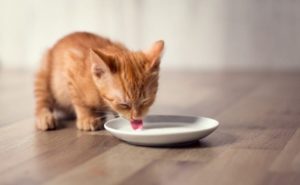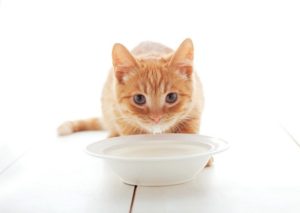As a new kittens owner, one of the most common questions that may come to mind is whether or not kittens can drink fresh milk. After all, it’s a common belief that cats love milk and it’s often portrayed in movies and cartoons. However, as with many things in life, what we see on TV isn’t always accurate. In this article, we’ll dive into the topic of whether or not kittens can drink fresh milk, the potential risks and benefits, and alternative options for providing your furry friend with proper nutrition.

1. Is Fresh Milk Harmful for Kittens?
The short answer is yes, fresh milk can be harmful for kittens. While kittens are able to drink fresh milk, they should not consume it regularly as their bodies are not equipped to digest it properly. This is because kittens lack the enzyme lactase, which is needed to break down lactose, the sugar found in milk. Without this enzyme, kittens cannot absorb the lactose in milk, leading to digestive issues such as diarrhea and vomiting.
The Importance of Proper Nutrition for Kittens
Kittens have specific nutritional needs that are essential for their growth and development. As they transition from nursing to solid food, it’s important to provide them with a balanced diet that meets their requirements. According to the American Society for the Prevention of Cruelty to Animals (ASPCA), kittens should be fed a combination of meat, fish, rice porridge, and vegetables after they are weaned. These foods provide kittens with the necessary nutrients for healthy growth and development.
While fresh milk may seem like a convenient option for feeding kittens, it does not provide the necessary nutrients for their growing bodies. In fact, it can do more harm than good, causing digestive issues and potentially impacting their long-term health.
How Much Fresh Milk is Safe for Kittens?
If you still want to give your kitten fresh milk, it’s important to monitor their intake and start with a small amount. According to the ASPCA, you can start with 1 teaspoon of fresh milk and observe your kitten for any adverse reactions. If they show no signs of discomfort or digestive issues, they may be able to tolerate small amounts of fresh milk.
However, it’s important to note that even small amounts of fresh milk can cause bloating, discomfort, diarrhea, and vomiting in kittens. This is due to the presence of lactose, which their bodies cannot properly digest. Therefore, it’s best to avoid giving fresh milk to kittens altogether.
2. Do Kittens Like Fresh Milk?

While kittens may enjoy the taste and smell of fresh milk, it’s not a necessary part of their diet. In fact, it can disrupt their appetite for other essential nutrients. Kittens are naturally attracted to the scent and taste of fresh milk, but this does not mean that it’s good for them.
The Risks of Giving Kittens Fresh Milk
Aside from the potential digestive issues, fresh milk can also have long-term negative impacts on kittens’ health. This includes their lifespan, reproduction, bone structure, and growth. As mentioned earlier, kittens lack the enzyme needed to break down lactose, which can lead to digestive problems. But this also means that they are unable to absorb the calcium found in milk, which is crucial for their bone development.
Moreover, giving kittens fresh milk, whether sweetened or not, can create a preference for this type of food and make it difficult for them to transition to a proper diet. This can lead to nutritional deficiencies and health issues in the long run.
Alternatives to Fresh Milk for Kittens
Instead of offering fresh milk, there are plenty of other options for providing your kitten with treats or snacks. These include cat-approved snacks or fruits that are safe for kittens to consume. It’s important to note that treats should only make up a small portion of your kitten’s diet and should not replace their regular meals.
3. Frequently Asked Questions (FAQ) About Kittens Drinking Fresh Milk
To further clarify any doubts or questions you may have about kittens drinking fresh milk, here are some frequently asked questions and their answers:
Can Kittens Drink Nonfat Fresh Milk?
While nonfat fresh milk may seem like a healthier option, it’s still not ideal for kittens. While it may contain less fat, it still contains lactose which can cause digestive issues. It’s best to avoid giving any type of fresh milk to kittens.
Is Cow’s Milk Safe for Kittens?
No, cow’s milk is not safe for kittens. In fact, it can trigger allergies or digestive problems, especially when full-fat and sweetened. It’s important to stick to a balanced diet recommended by a veterinarian to ensure your kitten’s health and well-being.
Can Kittens Drink Sterilized Milk?
No, sterilized milk is not suitable for kittens as it lacks essential nutrients and can lead to bone and reproductive issues. It’s best to avoid giving any type of milk to kittens and stick to a proper diet recommended by a veterinarian.
Is Raw Goat’s Milk Safe for Kittens?
Small amounts of raw goat’s milk can be safe for kittens as it’s gentler on their digestive system compared to cow’s milk. However, it’s important to consult with a veterinarian before giving your kitten any type of milk.

Conclusion
In conclusion, while kittens may enjoy the taste and smell of fresh milk, it’s not a necessary part of their diet and can do more harm than good. Kittens lack the enzyme needed to break down lactose, making it difficult for them to digest milk properly. This can lead to digestive issues, nutritional deficiencies, and long-term health problems. Instead of offering fresh milk, it’s best to provide your kitten with a balanced diet recommended by a veterinarian. This will ensure that they receive all the necessary nutrients for healthy growth and development.
